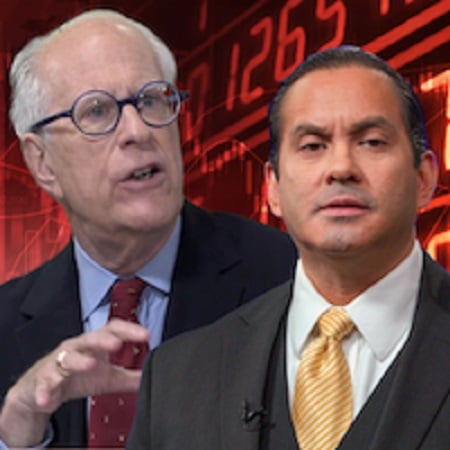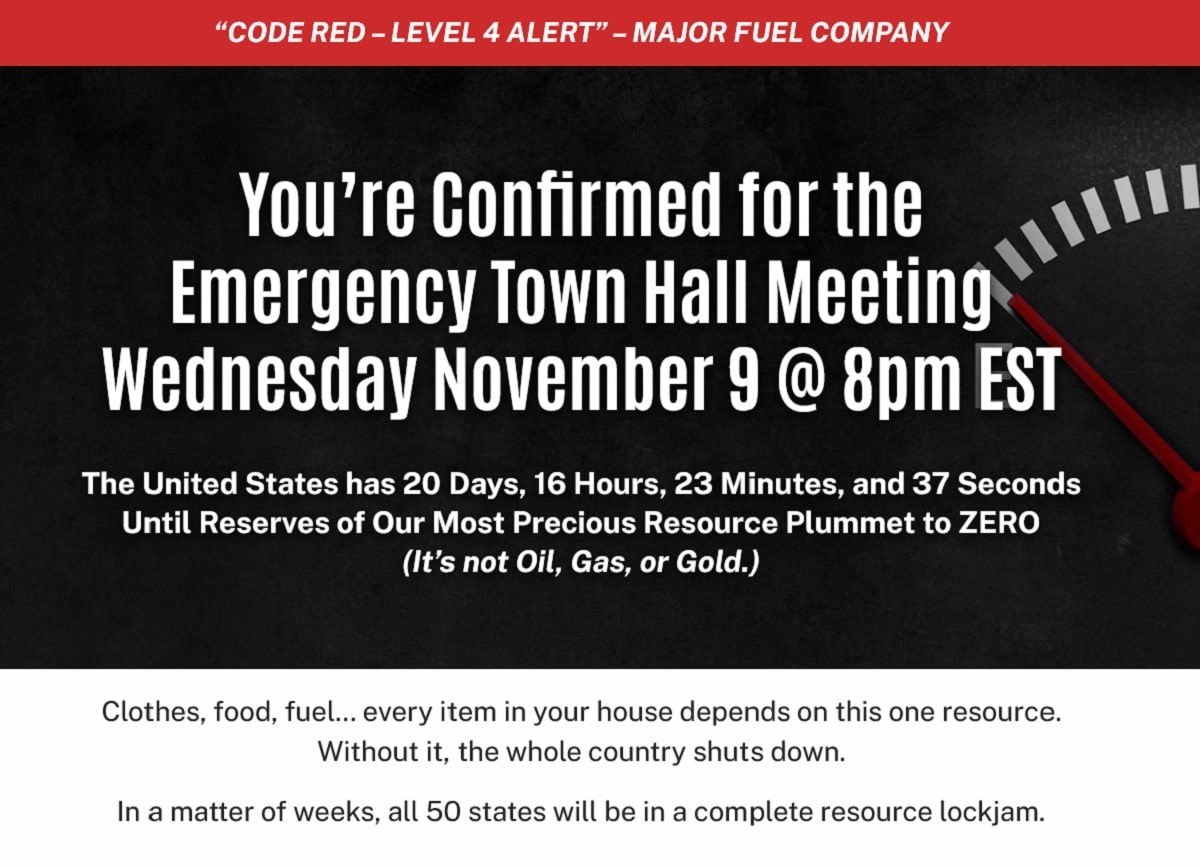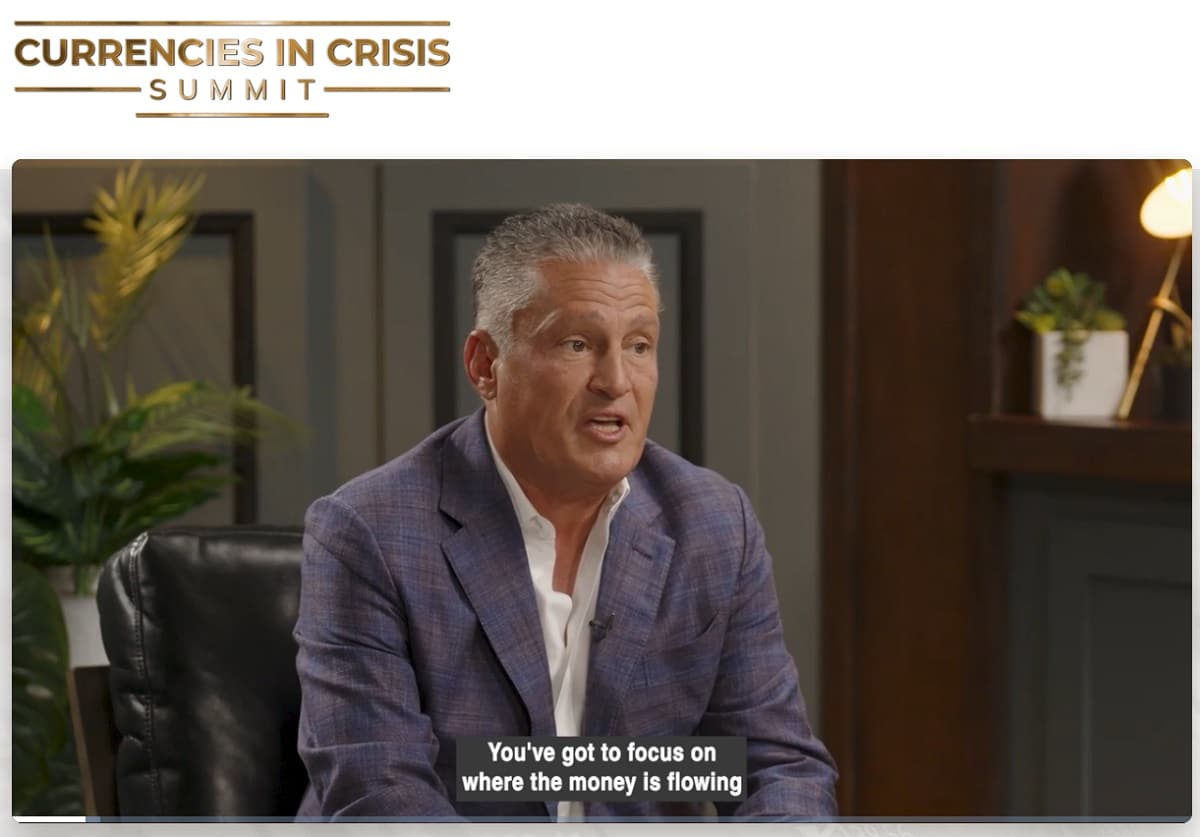There’s only 25 days’ worth of the U.S.’s most vital resource left in supply… a resource more valuable than oil, gas, and precious metals. The media and White House are staying silent about this code red situation… that’s why renowned economist Garrett Baldwin is taking urgent action.
Market Wizard, who predicted negative indexes in 2022, shares a shocking new forecast
Garrett Baldwin Emergency Town Hall Meeting – What is All About?
The media won’t report this until people are freezing in their homes without any food…
Even though it’s already been declared a level-four code red emergency in Maryland, Virginia, North Carolina, Tennessee, South Carolina, Georgia, Alabama, Connecticut, and Maine…
And more states are being added to the list each day.
The United States’ most precious resource is plummeting to ZERO – and the supply could be totally gone in as little as 25 days.
This resource is more vital to the U.S. economy than gas, oil, and precious metals.
Without this one resource, many Americans will have to survive the winter without food, heat, clothes, and other necessities.
They’re already handing out stimulus checks in Maine.
And other states could follow – which would lead to more money printing and higher inflation on top of everything else.
That’s why Garrett Baldwin is having an Emergency “Town Hall” Meeting this Wednesday, November 9 at 8 p.m. (ET)… and you should clear your schedule to be there.
Nothing is more important than this right now.
For those who wait for the media to cover this story, it will be far too late.
Unfortunately, they won’t whip out their cameras until people are suffering.
— RECOMMENDED —

“This is what I’m doing with my own money right now. I recommend you do the same”.
In a brand-new update, Dr. Steve Sjuggerud explains his No. 1 recommended sector that could reliably make you hundreds-of-percent gains in the coming months, no matter what the market does next.
See Steve’s urgent new message right here
Who Is Garrett Baldwin?
Garrett Baldwin is a globally recognized research economist, financial writer, consultant, and political risk analyst with decades of trading experience and degrees in economics, cybersecurity, and business from Johns Hopkins, Purdue, Indiana University, and Northwestern.
He also spent more than a decade as a corporate spy and still has his ear to the ground in Washington and on Wall Street, giving him a critical edge in his trading. He’s conducted risk-assessment projects for clients in 27 countries and consulted on policy and financial operations for some of the nation’s largest financial institutions, including a $1.5 trillion credit fund and a $43 billion credit and auto loan giant, as well as two of the largest Wall Street banks by assets under management.
Garrett joined Money Map Press as an economist and researcher in 2011, specializing in stocks, hedge funds, private equity, blockchain, and housing policy.
In addition to his lead role at the Flashpoint Trader, you can catch him on the Money Morning LIVE show, discussing the hottest stock and economic news and dishing out timely trade ideas with other Money Map experts and special guests.
Garrett Baldwin Emergency Town Hall Meeting Agenda
- Why the U.S. government is deliberately hiding this resource crisis from American families (Hint: They caused it…)
- A day-by-day outlook for when key supplies go to zero – and after.
- Garrett’s best and worst-case projections as this scenario unfolds, including strategic maneuvers to protect yourself.
- What to expect and plan for over the next 2-5 months and beyond.
When Is Garrett Baldwin Emergency Town Hall Meeting?
Garrett Baldwin Emergency Town Hall Meeting i sscheduled to take place on November 9 at 8 p.m.
Is It FREE To Attend Garrett Baldwin Emergency Town Hall Meeting?
It’s completely free to attend. Please don’t miss this.
At that point you’re maybe wondering which one is this U.S.’s most vital resource left in supply – a resource more valuable than oil, gas, and precious metals. Our guess is that Garrett Baldwin will talk about diesel.
Let’s go deep into this problem with a little help that comes from Robert Rapier and Investing Daily.
Understanding The Diesel Crisis
Distillates are one of the major categories of petroleum products made by oil refiners. The primary distillates are diesel, jet fuel, and heating oil.
The Energy Information Administration (EIA) shows that distillate inventories are at their lowest levels since 2008. However, distillate demand is seasonal. In 2008 distillate levels were low coming out of spring. Currently, they are low going into fall. That’s far worse than the situation in 2008.
Distillate demand generally spikes in spring — when farmers are planting crops — and in fall, when they are harvesting those crops and people start buying fuel oil for winter. Thus, a low distillate inventory in late April 2008 isn’t quite as serious as a low inventory in October 2022. In fact, distillate inventories haven’t been this low in October since the EIA began reporting this data in 1982.
These low distillate inventories are why diesel prices are above $5.00 a gallon nationwide, even though the nationwide average price for gasoline has dropped below $4.00 a gallon.
— RECOMMENDED —

It doesn’t matter if you have money in the markets right now, or you’re waiting on the sidelines. The short period we’re about to enter could have the power to make – or destroy – fortunes. And what you do in the coming days could determine your wealth for the next decade. Here’s what’s happening and how to prepare.
Factors Driving The Diesel Shortage
Why is there a diesel shortage this year? There are four factors, but two of those factors are in play every year.
As mentioned above, distillate demand spikes at this time of year. But, it does that every year.
This is also the time of year that refineries are doing maintenance. They tend to do that in the spring and fall, which is when demand is lower and the weather is decent. Refinery capacity drops at this time of year.
Third, U.S. refinery capacity has fallen in the past few years as several unprofitable refineries were closed. So, that’s a new factor that has appeared in the past couple of years.
But the primary reason is the cutoff of Russian imports. Prior to Russia’s invasion of Ukraine, the U.S. was importing nearly 700,000 barrels per day (BPD) of petroleum and petroleum products. Most of those imports were finished products and refinery inputs that boosted distillate supplies in the U.S.
The loss of those Russian imports have caused problems for refineries as they struggle to fill holes in their product slates. Refineries do have a small amount of flexibility in shifting gasoline production to diesel production. But it’s a relatively small amount (e.g., ~5% in a refinery I once worked in). That also means that if refiners do shift production, it potentially creates shortages in the gasoline market.
What About Distillate Exports?
One other factor that some have argued is that U.S. companies are exporting more than a million barrels of distillates a day.
That’s a fair point, but it isn’t a new development. U.S. companies have been exporting more than a million barrels a day of distillates for about a decade. The obvious question, then, is why this is being done.
The short and simple answer is that companies are doing it because they can, and because they are making more money doing this than selling it in the U.S. Consumers may complain, but ultimately these companies are trying to make as much money as they can, and that means selling products to the highest bidders.
A U.S. Gulf Coast refiner who wishes to ship distillates to the East Coast must abide by the Jones Act, which requires any cargo shipped between U.S. ports to be carried by U.S. ships, with American crews. This can drive up costs, and make it more economical for that Gulf Coast refiner to export to Europe or South America.
Another important point to note is that sometimes companies export distillates because the product doesn’t meet U.S. standards.
For example, in 2006 EPA began to phase-in more regulations to lower the amount of sulfur in diesel fuel to 15 parts per million (PPM). This required costly investments by refiners to comply. But, some refines chose to continue making high sulfur diesel, and to export that to countries with less stringent regulations. That practice continues today, and explains some of the exports.
— RECOMMENDED —
What happens in the coming weeks could make or absolutely break your retirement. That’s what history has shown when stocks are falling, inflation is rising, the Fed is raising rates, and economic activity is slowing. But Dan Ferris just stepped forward with an insanely simple solution to protect your wealth.
That is ultimately a business decision for each company, although it’s understandable that consumers would be upset by such decisions.
The other obvious question — which I am often asked — is why we don’t ban companies from exporting fuel during a fuel crisis? That’s ultimately a political question. Would the crisis be eased if such a ban were in place? It’s hard to argue that it wouldn’t, but it would exacerbate the crisis elsewhere.
Europe is already grappling with a fuel crisis due to situation in Ukraine. They are relying on U.S. exports to help ease their fuel burdens headed into winter.
An American consumer may say that this isn’t our problem, but companies aren’t exporting for altruistic reasons. Some countries are in worse shape than the U.S. with respect to fuel supplies, and they are willing to pay more to obtain them. That, in a nutshell, is why companies are exporting diesel during a diesel shortage.



![Reagan’s “Secret Currency” Uncovered [Michael Robinson Digital Fortunes]](https://e8u6c7p8.delivery.rocketcdn.me/wp-content/uploads/2023/02/Ronald-Reagans-Revenge.jpg)






















